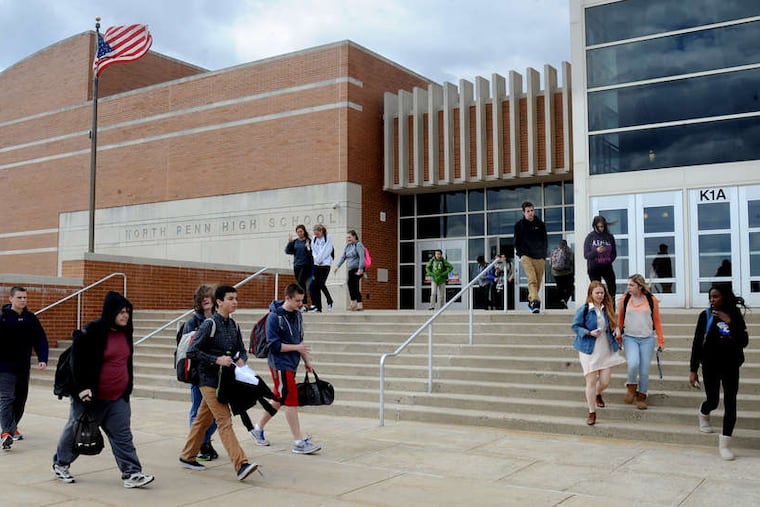North Penn voters reject proposed high school expansion to accommodate ninth graders
Today, North Penn is one of few districts in Southeastern Pennsylvania that doesn’t have ninth graders in its high school.

Voters in the North Penn School District on Tuesday rejected a proposal to borrow $97 million to expand the district’s high school to accommodate ninth graders, after opposition mounted to the project’s tax impact.
The proposed borrowing — part of a renovation plan that would have cost more than $400 million in total — failed in the special election, with 58% voting against it, said the district’s superintendent, Todd Bauer.
“We’re disappointed, obviously, with the results,” school board president Tina Stoll said Wednesday. She said the project, which would have enabled the district to move 1,000 ninth graders from its three middle schools to its high school, would have been “transformational” — coming about 30 years after an effort to build a second high school in the district failed.
Today, North Penn is one of few districts in Southeastern Pennsylvania that doesn’t have ninth graders in its high school, Stoll said; Central Bucks, Pennsylvania’s third-largest district, also doesn’t, but is planning to move ninth graders to high schools as part of an upcoming grade realignment.
The result in North Penn, Stoll said, is that ninth graders don’t have the same access as their older classmates to the high school’s offerings, like Advanced Placement classes or classes at the technical high school, requiring bus rides — and travel time — back and forth.
“It was an investment in our children’s education, and the future, and a community facility,” Stoll said. “The opposition was mostly I think people didn’t want to have their taxes increased.”
» READ MORE: The North Penn School District is launching a health center to save money and attract teachers. Others may follow.
A mailing sent by the district to voters showed that homeowners with properties assessed at $100,000 would see taxes increase by $162 a year as a result of a yes vote, while those with properties assessed at $300,000 would receive a $487 annual tax increase. It also included estimated tax impacts over 32 years, topping $10,000 for some households.
Even with a no vote, taxes would still increase to make other upgrades at the high school, the district said.
Those plans are anticipated to cost $236 million, according to the district, which didn’t need to seek voter approval for those upgrades. Pennsylvania law caps how much districts can raise in property taxes annually; the broader high school addition project to include ninth graders would have exceeded that limit by $97 million.
Opponents suggested that the district had enough money already. In one post on Facebook, North Penn United, a political action committee that supports Republican school board candidates, said ninth grade could be added to the high school “if budgeted within the legal limits.”
» READ MORE: Which school board candidates are backed by Moms for Liberty? Around Philly, it’s hard to tell.
But the district said it needs to make other upgrades to the high school, including to its heating and air-conditioning, plumbing, and electrical systems. “Basically the same footprint, with a few smaller additions to make sure we’re [Americans with Disabilities Act] compliant,” Stoll said of the planned $236 million project.
Following Tuesday’s special election — which drew 25% turnout — officials will “go back to the drawing board,” Stoll said. Not moving ninth graders to the high school will likely require the district to make renovations to the three middle schools, Stoll said, resulting in increased costs.
“We understand there are people on fixed incomes, and they had concerns, but in the long run we felt this would be less expensive,” she said.